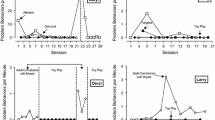Abstract
In the current investigation, the effects of violent and nonviolent active play activities on the results obtained within a brief functional analysis format were evaluated. A treatment procedure for the child was also carried out. The results indicated that aberrant behavior was displayed when the child was denied access to active play activities within the tangible functional analysis condition. Thus, it appears that for this child that active play served as a primary form of tangible reinforcement.
Similar content being viewed by others
References
Carr, E. G., and Durand, V. M. (1985). Reducing behavior problems through functional communication training. J. Appl. Behav. Anal. 18: 111-126.
Derby, K. M., Wacker, D. P., Sasso, G., Steege, M., Cigrand, C., and Asmus, J. (1992). The use of brief functional analysis within an outpatient clinic: A summary of 79 cases. J Appl. Behav. Anal. 25: 713-721.
Derby, K. M., Weber, K. P., McLaughlin, T. F., Williams, R. L., and Goris, M. (2002). Effective college based outpatient services. In Jacobson, J. W., Mulick, J. A., and Holburn, S. (Eds.), Programs and Services for People With Dual Developmental and Psychiatric Disabilities, Paul H. Brookes, Baltimore, MD, pp. 115-128.
Durand, V. M., and Carr, E. G. (1991). Functional communication training to reduce challenging behavior: Maintenance and application in new settings. J. Appl. Behav. Anal. 24: 251-264.
Durand, V. M., and Carr, E. G. (1992). An analysis of maintenance following functional communication training. J. Appl. Behav. Anal. 25: 777-794.
Iwata, B. A. (1994). Functional analysis methodology: Some closing comments. J. Appl. Behav. Anal. 27: 413-418.
Iwata, B. A., Dorsey, M. F., Slifer, K. J., Bauman, K. E., and Richman, G. S. (1994). Toward a functional analysis of self-injury. J. Appl. Behav. Anal. 27: 197-209.
Kazdin, A. E. (1982). Single Case Designs: Methods for Clinical and Applied Settings, Oxford University Press, New York.
McLaughlin, T. F., Williams, B. F., Williams, R. L., Peck, S. M., Derby, K. M., Bjordahl, J. M., and Weber, K. P. (1999). Behavioral training for teachers in special education: The Gonzaga University program. Behav. Interv. 14: 83-134.
Michael, J. L. (1982). Distinguishing between discriminative and motivational functions of stimuli. J. Exp. Anal. Behav. 37: 149-155.
Northup, J., Wacker, D. P., Sasso, G., Steege, M., Cigrand, K., Cook, J., and DeRaad, A. (1991). A functional analysis of both aggressive and alternative behavior in an outpatient setting. J. Appl. Behav. Anal. 24: 509-522.
Wacker, D. P., Steege, M. W., Northup, J., Sasso, G., Berg, W., Reimers, T., Cooper, L., Cigrand, K., and Donn, L. (1990). A component analysis of functional communication training across three topographies of severe behavior problems. J. Appl. Behav. Anal. 23: 417-429.
Author information
Authors and Affiliations
Rights and permissions
About this article
Cite this article
McLaughlin, T.F., Derby, K.M., Gwinn, M. et al. The Effects of Active and Violent Play Activities on Brief Functional Analysis Outcomes. Journal of Developmental and Physical Disabilities 15, 93–99 (2003). https://doi.org/10.1023/A:1022846515596
Issue Date:
DOI: https://doi.org/10.1023/A:1022846515596




